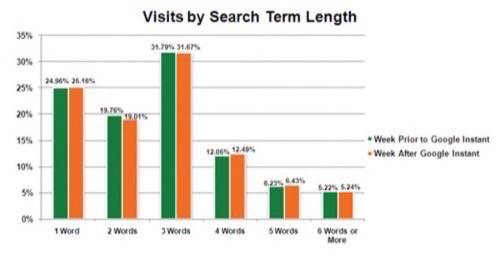Some speculated that Google Instant would drastically change the way people search by letting users see results for their queries as they typed.

That shift hasn’t happened yet, according to an analyst at Conductor, a company that provides search engine optimization tools to marketers. “It doesn’t appear to be having a significant impact on how users search,” Conductor concluded. But that’s not quite what the data show.
Length of queries hasn’t changed – but that doesn’t mean much
Conductor looked at more than 880,000 visits to ten “high traffic” websites in the week before and after the launch of Google Instant. Conductor grouped searches by the number of words in the query and concluded that “the distribution of traffic is identical week over week.”

The researchers conclude this means Google Instant has has “not much” impact on user search behavior. But the fact that queries contain the same number of words doesn’t mean user behavior is the same. This metric doesn’t reveal anything about whether searchers are using different words, spending more time refining their queries or performing fewer searches because they’re finding what they need faster.
SEO may need to change, whether SEO experts want to or not
“User behavior could have changed in other ways but the big shift people seemed to be talking about was around the length of queries changing because instant would cause changes in the way people search,” said Nathan Safran, senior researcher at Conductor.
Safran was referring to speculation that searches would start typing longer queries, leading them to lower-traffic sites in the Internet’s “long tail.” This could present a challenge to website owners and those in the search engine optimization field, who tailor websites to attract more traffic from specific queries.
“Somebody stop the Google Instant SEO is dead/crippled/forever changed hysteria train, I’d like to get off,” Safran wrote in a blog post about the research.
It may be in Conductor’s interests to say that user behavior is exactly the same after one of the biggest changes Google has ever made to its search engine. But there are lots of ways user search behavior could have changed. Google estimated Instant would save users between two and five seconds per search. That’s not because the results page no longer has to load, it’s because users are using Google differently. But changes in behavior – and ways SEO professionals might want to consider changing their methods – wouldn’t necessarily have been reflected in this data.
Too early to tell
It’s also been just 12 days since Google Instant came out, and I still catch myself pressing enter when I could be letting Google remix my results. Instant is a much different way of searching, and we’re betting that the full impacts on user behavior won’t be known until people get used to it.
Google Instant has inspired a rash of copycats, instantizing search for everything from Twitter and YouTube to iTunes. The art of SEO will be necessary as long as search engines are a major driver of Web traffic. But we’re betting that the field is going to have to adapt to post-Instant world (see How Will Google Instant Affect Your Company’s SEO?).
Google’s words on the subject: “Our most important advice to webmasters remains the same: Users want to visit pages with compelling content and a great user experience.”
Has Google Instant changed the way you search? Do you think it will impact the ability to optimize for Google?

















